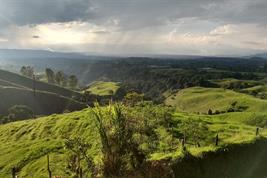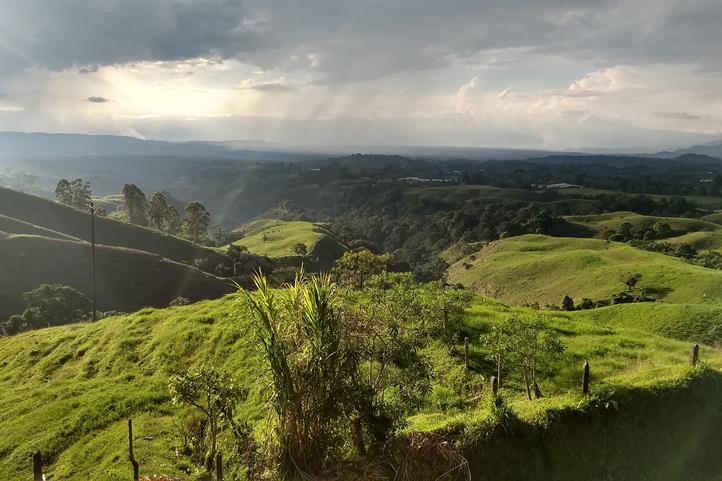20.05.2019
PRESS RELEASE

The peace agreement of 2016 ended the decade long war in Colombia. To build the peace, it is now necessary to create new livelihoods for people living in rural areas that were heavily affected by the conflict. This is the goal of the new research project “Implementing sustainable agricultural and livestock systems for simultaneous targeting of forest conservation for climate change mitigation (REDD+) and peace-building in Colombia (SLUS)”. It involves researchers of the Leibniz Centre for Agricultural Landscape Research (ZALF) and is funded by the German Federal Ministry of the Environment, Nature Conservation and Nuclear Safety (BMU) as part of the International Climate Initiative (IKI). To promote the start of the project and discuss its work in Colombia, ZALF is organizing the research event „Colombia Day“ on its campus in Müncheberg on 24th May, 2019.
The project started in early 2019 and is coordinated by the International Center for Tropical Agriculture (CIAT). Focusing on rural areas in the Amazonian forest, the research teams are working together with the local communities on sustainable land use options as new sources of income. Thus, they aim to prevent uncontrolled deforestation, which has already started to take place in some areas. Additionally, the scientists develop indicators for successful peacebuilding in post conflict areas.
The negotiated peace in Colombia makes forest areas once again accessible that were too dangerous to enter during the war. But the ownerships of these reopened areas are not yet determined or organized. In some places, this leads to the uncontrolled cutting of trees as a first means of income. There are concerns, that this deforestation can lead to similar problems in the future as the ones we see in the Brazilian Amazonas today, including environmental depletion and the continued displacement of rural communities.
Working together with the communities
For years, the SusLAND (Sustainable Land Use in Developing Countries) research group of ZALF has been working in developing countries to sustainably improve livelihoods and food security. The project in Colombia focusses on two rural areas, one in Caquetá, Southern Colombia and the other in Cesar, located in the Caribbean region. There, SusLAND will continue their transdisciplinary approach.
“This means we directly involve all relevant local stakeholders right from the beginning of the project”, says Dr. Michelle Bonatti of ZALF. “We will work on hands-on solutions to build up sustainable means of agriculture, including test runs with different crops and cultivars, soil sampling but also the analyses of the whole value chain to make sure, there is a stable market for the produced goods”, Bonatti adds. The emphasis will be on reintegrating native cultivars, such as cacao, formerly established systems of land use and knowledge, that may have been lost in the times of conflict.
Indicators for successful peacebuilding
Another aim of the project is to develop indicators on how to sustainably establish peace in conflict areas. Through research, on how measures such as mitigation and economic integration contribute to solidifying the peace process, the project team aim to create a guideline to keep other critical regions in the world from falling back into violent conflicts.
“Colombia Day” at ZALF
To promote the start of the project, the SusLAND team is organizing a „Colombia Day“ at ZALF campus in Müncheberg, Germany on 24th May, 2019. The programme includes the keynotes “Food Security, Sustainability and Peace: Can we have it all?” by Prof. Tilman Brück of Leibniz institute of vegetable and ornamental crops (IGZ) and “Uncertainties surrounding Payments for Watershed Services: Case studies from Colombia” by Prof. Tobias Krüger of Humboldt University, as well as presentations by the ZALF researchers and their partners from the Universidad Nacional de Bogota, Colombia.
For more information and registration go to:
ZALF Events
Funding notice:
This project is part of the International Climate Initiative (IKI). The Federal Ministry for the Environment, Nature Conservation and Nuclear Safety (BMU) supports this initiative on the basis of a decision adopted by the German Bundestag.
 Press Release as PDF
Press Release as PDF
Pictures
For downloading the pictures please click on a picture and use the icon.


The project SLUS focusses on rural areas in Colombia that are now save to enter again after decades of civil war. : Quelle: © Hector Morales.
